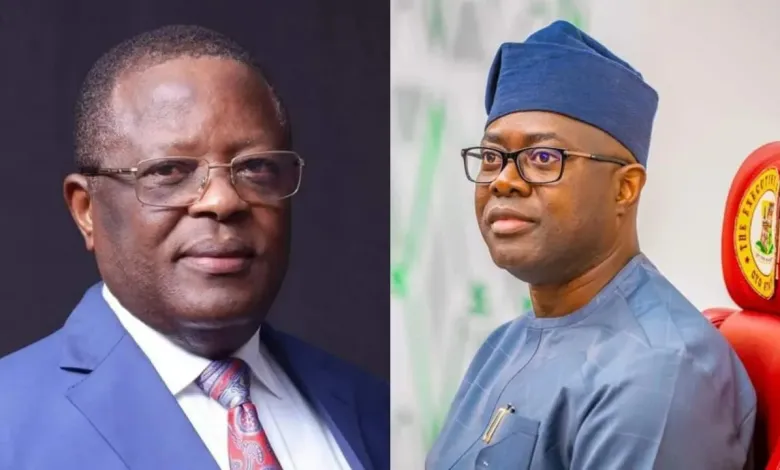The Minister of Works, David Umahi, has issued a stern response to Oyo State Governor, Seyi Makinde, following the governor’s public criticism of the cost per kilometre of the Lagos-Calabar Coastal Highway, a major infrastructure project spearheaded by the Tinubu administration.
During an inspection tour of the Keffi Bridge and Nasarawa–Toto Road projects on Saturday, accompanied by Nasarawa State Governor Abdullahi Sule, Umahi defended the federal government’s costing of the highway project, saying the figures were derived in accordance with global engineering best practices and should not be reduced to mere “political soundbites”.
Governor Makinde had, in a viral video circulating since Friday, questioned the transparency of the figures presented by Umahi. At a public event, the governor said, “These are elementary questions… A process is ongoing, payment has been made, and you are saying, ‘How has this money been utilised?’ The money is meant for the project, and it will be paid according to the work done.”
Makinde further criticised the minister, alleging he was “dancing around the cost” of the high-profile project, which stretches along Nigeria’s southern coast and is expected to drive economic growth and connectivity across multiple states.
Umahi responds: “Elect-Elect no reach there”
In his reply, Umahi described Makinde as a “brother and friend” but maintained that the governor had either misunderstood or misrepresented the technical basis for the cost estimates.
“I heard that my brother and friend, Governor Makinde of Oyo State, said something about the cost per kilometre. I don’t want to join issues with him. I think he is an engineer—perhaps an electrician—they call it ‘elect-elect’. But this road construction matter, elect-elect no reach there,” Umahi said.
Positioning himself as more experienced in both governance and engineering, the former Ebonyi State Governor advised Makinde to seek clarity directly rather than making public allegations.
“I am his senior both in governance and in engineering practice. So, anything he doesn’t understand, he should call me and ask,” Umahi said. “I have great respect for him, but he should withdraw the statement that I’m dancing around. I never danced around. If he insists, he should come for a debate—which is very important.”
Cost breakdown clarified
Umahi further elaborated on the technicalities of infrastructure costing, explaining the distinction between estimated and average cost per kilometre.
“There is no ambiguity in cost per kilometre. I am teaching them that cost per kilometre can be divided into estimated cost, which has elements of variance, and average cost, which is definitive,” he said.
He noted that estimated costs often include allowances for contingencies and variation of price (VOP), which may not necessarily be utilised in the end. Once the project is completed, unused provisions are subtracted to arrive at the actual cost.
“When the project is completed and you remove what you didn’t use—such as contingencies and VOP—then you have your actual cost,” he explained.
“AI agrees with me”
In a lighter aside, Umahi mocked critics who reportedly turned to Artificial Intelligence to fact-check his explanation.
“When somebody who is dangling without knowledge goes to ask AI what the difference is between cost per kilometre and average cost, I’m happy that AI told him exactly what I said,” he quipped.
“I’m a Professor in the Field”
Referencing the National Universities Commission (NUC)’s standards, Umahi said that hands-on experience in fieldwork is a legitimate path to professional recognition.
“You can become a professor by the reason of your practice. And I think God has made me one when it comes to practical, field engineering programmes. That’s what it is; you can’t take it back,” he stated.
The Lagos-Calabar Coastal Highway project remains one of President Bola Tinubu’s signature infrastructure initiatives, spanning several states and aimed at transforming coastal connectivity in Nigeria.
As the debate between state and federal officials intensifies, the conversation underscores the increasing public scrutiny on transparency, cost justification, and intergovernmental cooperation in national development projects.



